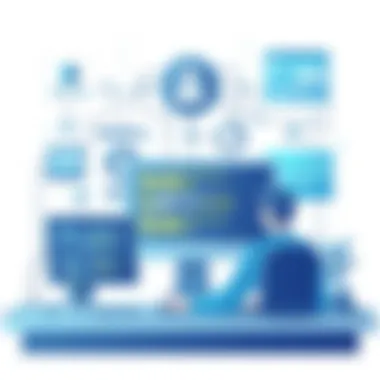Understanding the Role of Computer Systems Auditors


Intro
In today’s interconnected world, the notion of auditing has evolved far beyond what most people might think. It's not just about crunching numbers or ensuring financial records match up; it encompasses a more nuanced and critical focus—ensuring that computer systems are robust, secure, and functioning as intended. As organizations increasingly rely on digital infrastructure for operations, the role of computer systems auditors gains unparalleled significance. They don’t merely check boxes; they safeguard the integrity of information systems and enhance organizational resilience.
Understanding the importance of computer systems auditors involves peeling back layers of technological advances and regulatory demands, all while recognizing the core principle: trust. Trust within an organization's systems reflects not only on its internal processes but also on its reputation among clients and stakeholders alike. Let's dive headfirst into the essential elements that characterize this dynamic field and explore how these auditors contribute to maintaining the delicate balance of risk, compliance, and performance in computer systems.
Prelude to Computer Systems Auditors
Computer systems auditors play a critical role in the digital landscape we navigate today. As organizations increasingly rely on technology to enhance performance and achieve business objectives, the need for trustworthy oversight becomes apparent. These auditors serve not just as watchdogs but also as trusted advisors, ensuring that systems function efficiently, securely, and in compliance with regulatory requirements. It’s through their lens that organizations can gain clarity on potential vulnerabilities that might otherwise go unnoticed.
The spotlight on computer systems auditors has intensified in recent years, with many businesses recognizing how pivotal these experts are to securing sensitive data. From evaluating system performance to assessing security measures, their multifaceted responsibilities form the bedrock of effective IT governance. Without the rigorous assessments provided by these professionals, organizations could face significant risks ranging from data breaches to financial discrepancies.
Defining Computer Systems Auditing
Computer systems auditing encapsulates a broad array of functions aimed at evaluating the reliability and effectiveness of IT systems. It is not merely about checking boxes; it involves a detailed examination of how systems manage data, comply with regulations, and safeguard against risks. The objective is often to provide assurance that IT systems are operating as intended, and to identify any areas ripe for improvement.
Audits can be proactive or reactive, intended to detect potential issues before they become problematic or to investigate incidents already in action. This growing trend highlights the significance of embedding audit functions within the lifecycle of IT projects, not just as a final checkpoint.
Key Aspects of Computer Systems Auditing:
- Comprehensive system reviews align with broader organizational goals.
- Risk assessment to identify vulnerabilities and controls.
- Recommendations to enhance processes and ensure compliance.
The Historical Context of Auditing in IT
Auditing within the realm of information technology has evolved markedly since its inception. Initially, audits were conducted for financial records, with professionals focusing on the accuracy of transactions and reports. As computer systems gained prominence in businesses, it became clear that technical systems also required scrutiny. The late 20th century marked a pivotal moment when financial audits began incorporating IT audits, recognizing that the accuracy of financial reporting hinged on the integrity of computer systems.
The evolution continued with the emergence of regulatory frameworks, like Sarbanes-Oxley act (SOX) in the early 2000s, which explicitly mandated IT controls as part of financial audits. These events catalyzed the growth of specialized roles within the auditing profession, formally recognizing computer systems auditors as essential figures in the audit ecosystem. The transition into this new era has created a unique blend of technical skills and traditional auditing principles, establishing a framework where technological and regulatory compliance go hand in hand.
"In the digital age, the role of auditors has shifted from merely reviewing financial statements to proactively ensuring that systems function safely and securely."
Auditing today is not just about compliance; it is about enabling organizations to pursue innovation while managing risk effectively. As technology continues to evolve, the historical context of auditing in IT reminds us that a keen eye on the interface between technology and business practices is vital. The foundations laid over the decades should serve as a springboard into the future, where computer systems auditors will continue to redefine their impact on organizational success.
Core Responsibilities of Computer Systems Auditors
Computer systems auditors play a crucial role in the overall health and integrity of an organization’s IT environment. They are not just gatekeepers but active participants in the upkeep of security, compliance, and operational efficiency. Their core responsibilities are woven into the fabric of enterprise operations, fundamentally ensuring that the technology aligns with business objectives while mitigating risks and safeguarding sensitive information.
Performance Evaluations and System Assessments
One of the primary duties of computer systems auditors involves the meticulous evaluation of performance and thorough assessments of systems. This goes beyond simply checking if systems are functioning; it’s a deep dive into whether those systems are meeting an organization’s goals. Auditors engage in performance metrics analysis, examining everything from processing speeds to transaction errors. This detailed examination can often pinpoint areas of inefficiency or bottlenecks that might otherwise go unnoticed.
To put it plainly, these assessments are vital as they provide management with a clear picture of their IT infrastructure’s health. Regular performance evaluations can help in:
- Identifying weaknesses in system design or implementation.
- Recommending improvements for better resource allocation.
- Forecasting potential future issues before they become critical.
This kind of proactive assessment not only helps in enhancing the overall efficiency of the systems but also delivers tangible benefits in terms of cost-saving and reliability.
Security Audits and Risk Assessment
When it comes to safeguarding information, security is paramount. Computer systems auditors focus heavily on conducting security audits that assess vulnerabilities within an organization’s IT landscape. This can involve reviewing access controls, data encryption protocols, and cybersecurity measures in place.
A primary goal of these audits is to identify any potential weak spots that could be exploited by malicious actors. Auditors utilize various methodologies such as:
- Risk Assessments: Evaluating the likelihood of a data breach or system failure and its potential impact on the organization.
- Penetration Testing: Simulating cyber attacks to gauge the effectiveness of the current security posture.
By diligently identifying and addressing vulnerabilities, these auditors help organizations protect themselves from the rising tide of cyber threats.


Compliance with Regulations and Standards
Lastly, ensuring compliance with regulations and standards is a cornerstone of the auditor’s responsibilities. There are numerous laws and standards governing the IT operations within organizations, like GDPR for data protection or PCI DSS for payment processing. Failing to adhere to these regulations can result in hefty fines and damage to reputation.
Computer systems auditors provide invaluable assistance in this regard, as they:
- Develop and implement compliance frameworks tailored to specific organizational needs.
- Regularly update compliance checklists in response to evolving laws and international standards.
- Conduct training sessions for employees to raise awareness about compliance guidelines.
In summary, the responsibilities of computer systems auditors are extensive and critical to an organization’s success. From performance evaluations and security audits to ensuring regulatory compliance, their work is integral in creating a secure and efficient IT infrastructure. They not only help organizations mitigate risks but also contribute to a culture of accountability and transparency in technology practices.
"Auditors are the unsung heroes of the digital world, ensuring systems not only perform but do so securely and compliantly."
For more details on various compliance standards, readers can explore resources from NIST and ISO.
Their role is more relevant today than ever, making them indispensable assets in a landscape where technology constantly evolves.
Essential Skills for Computer Systems Auditors
In the complex world of IT and systems management, the role of computer systems auditors stands out. As they navigate through intricate web of system security and compliance, possessing the right skills becomes paramount. Understanding these essential skills not only enhances their effectiveness but also underlines their pivotal importance in safeguarding organizational interests. The expertise of auditors fosters trust in technology systems, encouraging companies to invest in digital solutions without a hitch.
Technical Proficiency in IT Systems
The backbone of any computer systems auditor is their technical proficiency in IT systems. This is not just about knowing how to operate a computer; it's about grasping the layered intricacies that make up information technology frameworks.
- Understanding Network Architecture: A solid foundation in how networks operate, including server-client relationships and the roles of firewalls is crucial. An auditor who can visualize the architecture can identify vulnerabilities in networks before they become a hazard.
- Proficiency with Operating Systems: Familiarity with different operating systems, whether it's Windows, Linux, or UNIX, allows auditors to not only navigate systems but also assess their vulnerabilities effectively.
- Knowledge of Database Management: For auditors, understanding databases is non-negotiable. They should know how data is stored, accessed, and secured to evaluate whether an organization is adhering to data governance practices.
Technical skills form the groundwork for a credible auditor; without them, the assessment of systems remains superficial at best.
Analytical and Critical Thinking Skills
Equipped with technical know-how, the next layer lies in analytical and critical thinking skills. The ability to scrutinize data, identify patterns, and draw meaningful conclusions is what separates good auditors from great ones.
- Problem Solving: Auditors often face unexpected issues during audits. Using critical thinking, they must assess situations, identify root causes, and recommend viable solutions. This skill ensures that they don't just patch problems but address underlying issues.
- Data Interpretation: It's essential to sift through massive sets of data and distill insights. Analytical skills help auditors understand trends that might indicate compliance failures or security breaches.
- Risk Assessment: Understanding potential risks and their implications is vital. Skilled auditors evaluate risks with a keen eye, enabling organizations to devise more robust strategies against vulnerabilities.
"A penny saved is a penny earned." In auditing, this rings true when auditors utilize their analytical prowess to save organizations from potential losses that could arise from audit failures.
Communication and Reporting Abilities
Lastly, a lesser-discussed yet crucial aspect of being a computer systems auditor is solid communication and reporting abilities. Often, a thorough report can speak volumes, while strong communication can ensure recommendations are understood and implemented.
- Clarity in Reporting: Auditors compile data into reports that must convey findings simply and effectively. A good report distills complex issues into clear, actionable insights without diluting the core message.
- Stakeholder Interaction: Whether it’s IT teams or senior management, auditors must engage with various stakeholders. Effective communication ensures that auditor recommendations are not just well-received but also acted upon.
- Training and Awareness: Auditors often conduct training sessions, helping others understand compliance standards and best practices. This requires the ability to convey technical jargon in layman’s terms, fostering a culture of awareness.
Communication bridges the gap between technical findings and actions taken, ensuring that the recommended practices are adopted not just as a checkmark, but as ingrained habits within organizational culture.
The Methodologies Employed in Auditing
In the rapidly evolving landscape of information technology, the methodologies employed in auditing have become paramount. These methodologies serve as the backbone for computer systems auditors, providing a structured approach to evaluating systems, identifying vulnerabilities, and ensuring compliance with regulations. The importance of these methodologies extends beyond mere procedure – they are fundamental in safeguarding organizational integrity and enhancing overall operational efficacy.
Risk-Based Auditing Techniques
Risk-based auditing is a fundamental technique that aims at prioritizing areas of concern according to the level of risk they pose to the organization. This approach is not only strategic but also practical, allowing auditors to allocate resources effectively and focus on the aspects of the system that matter most. For instance, an organization might have numerous applications and infrastructure components; however, not all of them carry the same level of risk. By identifying high-risk areas, auditors can tailor their efforts, leading to more effective assessments.
The essence of risk-based auditing lies in its adaptive nature. It takes into account the unique operational context of each organization and its specific vulnerabilities, rather than adopting a one-size-fits-all methodology. This means that as new technologies emerge or as business environments change, auditors can adjust their approach. They frequently utilize tools and frameworks, leveraging data to assess potential impacts on operations.
A few elements of risk-based auditing techniques include:


- Risk assessment matrices: These visual tools help categorize and prioritize risks.
- Interviews and surveys: Engaging with employees provides real-world insights on potential weaknesses.
- Scenario analyses: Auditors simulate potential incidents to understand their implications.
As a result, the organization can bolster its defenses where it matters most, ensuring resources aren't wasted on elements that pose minimal risks.
Data Analysis and Forensic Techniques
Data analysis and forensic techniques represent another critical area of focus for computer systems auditors. In a world awash with data, auditors must be skilled in discerning patterns and anomalies that may indicate security problems or inefficient processes. This methodology employs sophisticated analytics tools to sift through large volumes of data, aiming to reveal hidden insights that traditional inspection techniques might overlook.
The role of data analysis is particularly significant when it comes to identifying indirect indicators of system failure or security breaches. For instance, a sudden spike in network traffic may lead to the discovery of unauthorized access attempts. Using analytical techniques allows auditors to act proactively, rather than reactively, ensuring that potential issues are addressed before they escalate.
Additionally, forensic techniques come into play when incidents occur. They involve a deep dive into system logs, user activities, and data transactions to reconstruct events leading up to a breach or failure. This not only helps identify the scope of the problem but can also be vital in potentially legal scenarios where data recovery and integrity are challenged.
Some critical aspects that these techniques encompass are:
- Data mining: Utilizing algorithms to extract patterns from large datasets.
- Log analysis: Reviewing system logs to trace user activity and detect discrepancies.
- Incident response procedures: Establishing clear steps for auditors to follow in the event of a breach.
"Employing data analysis and forensic techniques not only aids in uncovering current issues but also equips organizations with the knowledge to preempt future occurrences through informed decision-making."
Challenges Faced by Computer Systems Auditors
Computer systems auditors are often regarded as the first line of defense in maintaining the integrity of IT frameworks in organizations. However, the landscape they operate in is far from static, throwing a unique set of challenges their way. Without brushing these issues aside, it’s essential to address how these auditors navigate through them and what implications arise from their efforts. In understanding the hurdles faced by auditors, one can grasp not just their critical role, but also the demands the ever-evolving tech environment places on them.
Keeping Up with Rapid Technological Changes
The swift pace of technological advancements poses significant challenges for computer systems auditors. Tools and systems change continuously, often faster than the speed at which the auditors can adapt. Take, for instance, the emergence of Blockchain technology. While it promises enhanced security and transparency, it also brings about complexities in the auditing process itself, requiring auditors to be knowledgeable about its unique attributes.
Auditors need to stay informed not only about new technologies but also about automation, cloud services, and the internet of things (IoT). This might involve ongoing education and training to familiarize themselves with the newest trends. An auditor who lags behind can quickly find their assessments becoming obsolete. The following points highlight key aspects of this challenge:
- Constant Learning: Regular training and updates on the software and hardware landscape are not optional; they are essential.
- Resource Allocation: Organizations might not always allocate enough resources for the training or tools auditors need, making it tougher for them to meet industry standards.
- Decision-Making Speed: The fast evolution means auditors have to make quick yet informed decisions, often with limited historical data to reference.
“The technology of today becomes the commonplace of tomorrow, and catching up is not just a matter of moving fast; it’s about strategic foresight.”
Managing Compliance Complexities
In today’s regulatory environment, compliance isn’t just a checkbox; it’s a labyrinthine structure auditors must navigate carefully. Each organization operates under distinct guidelines that govern everything from data protection to financial reporting. The introduction of regulations like the General Data Protection Regulation (GDPR) in Europe signaled a fundamental shift, elevating the focus on data privacy and security. Computer systems auditors must make sure that an organization complies not only with local laws but also with international standards.
Here are some considerations auditors face in the compliance realm:
- Diverse Regulations: Different regions have their own laws, complicating audits for global organizations. An auditor has to be aware of nuances that might change dramatically between jurisdictions.
- Rapid Regulatory Changes: Laws frequently get updated, and auditors need to ensure compliance with the most current standards.
- Documentation and Reporting: Thorough record-keeping is mandated, and ensuring that everything is documented properly can become burdensome.
The importance of meticulousness cannot be overstated. A lapse in adherence can lead to severe penalties, not only financially but also in terms of reputation. For auditors, managing these complexities is crucial to ensure that their organizations can operate smoothly, free from legal encumbrances. By understanding the ever-changing landscape of compliance requirements, they solidify their role as not just overseers but as enablers of sustainable practices in IT.
In summary, challenges are inherent in the role of computer systems auditors, but how they address these obstacles illustrates their importance in a tech-driven world.
The Impact of Emerging Technologies
The landscape of computer systems auditing is undergoing a seismic shift with the advent of emerging technologies. These innovations not only enhance the efficiency of auditing practice but also introduce new complexities and challenges. As organizations increasingly rely on technology to streamline operations, the role of computer systems auditors becomes more critical in ensuring that these systems are not only effective but also secure and compliant with legal standards.
Auditors must now navigate through a labyrinth of technologies that can transform traditional audit methodologies. Specifically, two technologies stand out: cloud computing and artificial intelligence. Their implications are profound and merit a closer examination.
Cloud Computing and Its Implications for Auditing
Cloud computing has revolutionized the storage and management of data. This innovation offers organizations flexibility and scalability, but from an auditing perspective, it raises several eyebrows. When data is stored off-site on cloud platforms, how can auditors ensure its integrity and security?
Some positive aspects of cloud computing from the auditing lens include:


- Centralized Data Access: Auditors can access and analyze data more quickly, as cloud computing allows for central storage and easier sharing of information.
- Real-Time Auditing: Many cloud services provide real-time data analytics, enabling auditors to conduct assessments and provide recommendations more promptly.
- Cost-Effectiveness: Leveraging cloud services can reduce overhead costs associated with maintaining traditional infrastructure, allowing audit teams to reallocate resources.
However, there are significant considerations:
- Data Privacy Concerns: With multiple clients accessing the same server, sensitive information might be at risk of exposure. Auditors must scrutinize cloud service providers and ensure that robust encryption and access controls are in place.
- Regulatory Compliance: Different regulations might apply based on where data is stored. For example, GDPR compliance could be complex when data is hosted in different countries.
- Vendor Reliability: The stability and security of third-party vendors are paramount. Auditors need to carefully evaluate cloud vendors’ security protocols and track records.
In sum, the move towards cloud computing is not without its hurdles, but with experienced auditors at the helm, organizations can confidently make the transition.
Artificial Intelligence in Auditing Processes
Artificial Intelligence (AI) has emerged as a powerful ally in the auditing domain. AI can analyze vast amounts of data much faster than a human could while identifying patterns and discrepancies that one might miss. The integration of AI can bolster the auditing process in several key areas:
- Automation of Routine Tasks: Auditors can automate repetitive tasks, such as data entry and transaction review, ensuring more time for strategic analysis.
- Predictive Analytics: AI tools can use historical data to predict future trends, enabling organizations to proactively address potential risks.
- Enhanced Fraud Detection: Machine learning algorithms can be employed to spot anomalies in transaction data, thereby enhancing fraud detection efforts.
While the benefits are numerous, there are also challenges associated with implementing AI:
- Bias in Algorithms: Algorithms are only as good as the data fed into them. If the data is biased, the results can be misleading.
- Dependence on Technology: Reliance on AI tools can create complacency. Auditors must ensure they remain engaged in the audit process and critically evaluate AI findings.
- Ethical Considerations: The use of AI raises ethical questions about data usage and privacy. Auditors must balance the advantages of AI with an awareness of these concerns.
"The integration of AI into auditing marks a significant leap forward, but auditors must remain vigilant, ensuring that technology acts as a tool rather than a crutch."
Ultimately, as emerging technologies like cloud computing and artificial intelligence shape the future of auditing, computer systems auditors must adapt and refine their methodologies. This evolution presents not just challenges but also opportunities for enhancement and growth in the field.
Future Directions for Computer Systems Auditors
The landscape of computer systems auditing is evolving at a blistering pace. As organizations become more reliant on technology and the digital sphere grows, the role of computer systems auditors is entering uncharted territory. Understanding these directions is vital for ensuring security, compliance, and strategic effectiveness within businesses. Future trends not only provide a glimpse into the responsibilities of auditors but also underscore their significance in shaping how organizations approach technology risk management.
Evolving Roles in an Integrated IT Environment
In the past, computer systems auditors often handed down periodic assessments, with their roles focused primarily on compliance and risk evaluation. However, as we step into an era characterized by an integrated IT environment, these auditors are becoming pivotal players in strategic planning and execution. No longer are they just monitors; they have morphed into essential partners in the decision-making processes.
A few specific trends can be observed:
- Cross-Functional Expertise: Computer systems auditors are increasingly collaborating with IT professionals, business leaders, and even legal teams. Their insights into IT security are needed to guide business strategies efficiently.
- Proactivity: Instead of just reviewing past actions, auditors will begin to predict future risks. This proactive stance can help organizations implement countermeasures before issues arise, saving time and resources in the long run.
- Continuous Monitoring: As systems and technologies develop, so does the need for real-time assessments. Auditors are now adopting tools that facilitate continuous testing and monitoring, allowing them to respond to potential threats or compliance breaches immediately.
Increased Focus on Cybersecurity
With the rise of digitization, the stakes for cybersecurity have never been higher. For organizations, a breach is not merely an inconvenience; it can lead to significant financial losses and damage to reputation. As a result, the role of computer systems auditors is sharply pivoting towards enhancing cybersecurity measures.
Consider these factors driving this increased focus:
- Regulatory Pressures: Governments around the world are amping up regulations around data security. Computer systems auditors must stay abreast of these changes and ensure that organizations are compliant, thereby protecting themselves from potential fines and legal troubles.
- Threat Landscape: Cyber threats are becoming increasingly sophisticated, meaning that the traditional security measures may no longer suffice. Auditors will need advanced skills in identifying potential vulnerabilities caused by new technology implementations.
- Training and Skills Development: Educational programs are adapting to train auditors not just in accounting practices but also in cybersecurity frameworks, incident response, and threat hunting. This shift in training ensures that auditors are well-prepared to confront emerging threats.
Future directions for computer systems auditors emphasize a blend of security, adaptability, and technological fluency. Their evolving roles will significantly define how organizations protect their critical assets.
In summary, as technology and threats continue to blossom, the role of computer systems auditors is shifting from a supportive function to one of strategic importance. By embracing new responsibilities and trends, these professionals are poised to guide organizations toward a more secure and compliant future, one audit at a time.
End
In the landscape of modern organizations, computer systems auditors play a crucial role that cannot be overstated. These professionals serve as the backbone of a company’s ethical and operational integrity, ensuring that systems not only function properly but also align with regulatory requirements and industry standards. Here, we summarize the key aspects that highlight their importance in the broader context of business operations.
Summarizing the Importance of Computer Systems Auditors
The significance of computer systems auditors spans various dimensions, which can be succinctly summarized as follows:
- Risk Management: By identifying vulnerabilities and potential threats within IT infrastructures, auditors help organizations mitigate risks proactively. This is essential in a world where cyber threats are ever-evolving.
- Compliance Assurance: In an era of stringent regulations, such as GDPR or HIPAA, auditors ensure that organizations comply with these rules, hence avoiding hefty fines and reputational damage.
- Operational Efficiency: By assessing existing systems and processes, these auditors provide insights that can lead to improved efficiency and reduced costs. They not only pinpoint weak spots but also suggest enhancements that can streamline operations.
- Enhanced Security Posture: As businesses adopt more advanced technologies—like cloud solutions or AI—having a dedicated auditor ensures that security measures keep pace with such advancements, safeguarding sensitive data.
"The role of computer systems auditors extends beyond mere diagnosis; it's about cultivating a culture of continuous improvement and vigilance in technology use."
In essence, the evolving landscape of digital transformation mandates that organizations take a proactive approach to auditing. Not only do computer systems auditors uphold the integrity of systems, but they also act as strategic partners in the overarching quest for sustainable, secure, and efficient business practices. Their contributions are invaluable and undeniably vital in today’s prescriptive business environment.
With the rapid advancement in technology and associated complexities, it is evident that the role of computer systems auditors will continue to grow in importance, paving the way for innovative solutions to new challenges.



